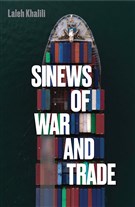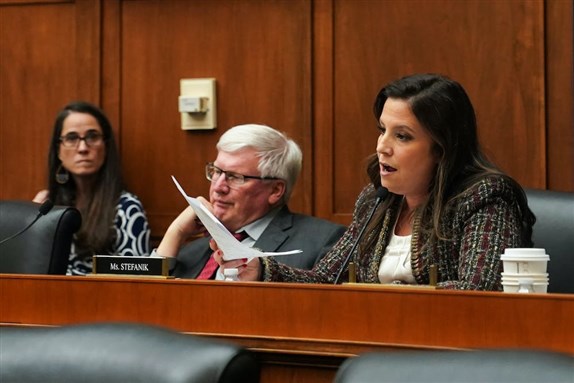[The Ansar Allah movement in Yemen, also known as the Houthis, recently escalated its intervention on behalf of the Palestinians in the Gaza Strip to include not only Israeli ships seeking to enter the Red Sea, but any ship docking at an Israeli port. The United States on 18 December announced Operation Prosperity Guardian with the objective of ensuring that the maritime chokepoint of Bab al-Mandab is open to all commercial shipping. Mouin Rabbani, Editor of Quick Thoughts and Jadaliyya Co-Editor, interviewed Laleh Khalili, author or Sinews of War and Trade: Shipping and Capitalism in the Arabian Peninsula, to get a better understanding of the context and significance of this crisis]
Mouin Rabbani (MR): What is the significance of Bab al-Mandab to global trade and supply chains?
Laleh Khalili (LK): Bab al-Mandab at one end of the Red Sea is the gateway to the Suez Canal, the main maritime artery between Asia and Europe. Some twelve percent of global maritime trade travels on ships through the Canal, and the Canal cuts down the travel between those two continents by around two weeks. Perhaps more importantly, when fuel prices are relatively high, traveling through Suez cuts the cost of fuel required to ship cargo between Asia and Europe.
Ships on this route carry commodities from East Africa lifted on Red Sea ports; oil from the Gulf; products manufactured in China and elsewhere in Asia, including materials used in multi-sited manufacturing; as well as high-tech products, specialist chemicals used in manufacturing, and luxury goods shipped from Europe to Asia.
MR: What impact have Yemeni efforts to prevent the passage of Israeli ships, and more recently of any ships sailing to/from Israeli ports, had on Israel? What is Yemen's Ansar Allah movement seeking to achieve?
LK: It is difficult at this stage to assess the actual economic impact of this move. Eilat is not as significant a port as Israel's Mediterranean ports, and although some of the cargo from Asia would have gone through the Suez Canal to the major Israeli ports at Haifa or Ashkelon, the trade between Europe and Israel remains largely unaffected. The Houthi operations would have also affected the flow of oil to the Eilat-Ashkelon pipeline; this oil is now largely provided by companies that are subsidiaries of firms based in Abu Dhabi and tied to the ruling Al-Nahyan family. For electricity generation Israel is reliant on the Mediterranean natural gas fields (sixty percent of its energy needs) and coal (thirty percent of its energy needs). According to the OECD, Israel imports its coal from Colombia, South Africa, and Russia. Although the first two of these have severed diplomatic relations with Israel, I suspect commercial contracts are still being fulfilled.
Where the Houthi operations are far more significant is in the sphere of politics. The fact that a cost is extracted from Israel and from its major international supporters is a political victory for the Ansar Allah, who want to see Israel isolated. Israel wants to engage in its destruction of Palestinian lives, livelihoods and infrastructures while maintaining some degree of normality at home. These activities make this harder to achieve.
MR: Given that attacks by Yemen's Ansar Allah are directed specifically at Israel, why are shipping companies whose ships are sailing to other destinations avoiding this route, and what is the impact of their decisions?
LK: In part this is because shipping companies are not 100 percent certain about the parameters of Ansar Allah attacks: are these attacks against any shipping companies going through Bab al-Mandab, or against ships docking at Israeli ports? Though Ansar Allah have clearly declared their intent, this is a matter of concern for shipping companies. One thing that is important to note is that container ships very rarely carry cargo with only one destination. They often have clearly planned routes where they drop and lift cargo. So, for them, an interruption because of Israel is a disruption to their entire schedule.
Another factor to consider is the immediate increase in the cost of insuring cargo going through the Red Sea. Bloomberg has reported that war risk insurance had increased tenfold with the ramping up of Israeli violence against Palestinians in Gaza, and has during the past week quintupled again. This means that for a ship carrying $100 million worth of cargo, its voyage through the Suez Canal now requires a $500,000 premium.
This is all happening at a moment where the Panama Canal is also facing a crisis, as drought and lower water levels have made its lock system much harder to operate, and traffic through the Panama Isthmus has been drastically reduced to accommodate this climate disaster.
The combined effect of these developments, and especially of Ansar Allah operations is a slowing down of supply chains, with manufacturing in various corners of the world being dramatically affected, an increase in the price of cargoes of oil, and a threat of inflation.
MR: What is your assessment of Operation Prosperity Guardian? Is its objective to keep Bab al-Mandab open to Israeli shipping or does it have larger objectives? Has this initiative transformed the war on Gaza into an international and potentially global economic crisis?
LK: Since 7 October, one aim of Netanyahu has been to expand the war regionally, to further ensnare the US in the region, to strike against Israel’s regional rivals, and to allow for Netanyahu to survive in his position for just that much longer. Operation Prosperity Guardian is I think the Pentagon’s attempt to assuage Israel and flex some proverbial muscle. But at this stage it is hard to see it being much more than that.
The countries apparently participating in the task force include Britain, Bahrain, Canada, France, Italy, the Netherlands, Norway, The Seychelles, and Spain. What is interesting about this list is not what it says but what it does not say. France already has a frigate in the Red Sea which is joining the task force. Italy has announced it is there to protect Italian shipping (and the world's largest shipping company, MSC, which is owned by an Italian family, though headquartered in Switzerland). Spain has said something noncommittal about operating only under the auspices of NATO. The Netherlands and Norway (both significantly dependent on maritime commerce) have sent 2 and 12 naval officers respectively. Bahrain is on the list because the US’s Combined Task Force 153 under whose banner Operation Prosperity Guardian is functioning is based on the island. The Seychelloise military leaders felt that they had to justify their presence by emphasising that they are billeting no men or women to the Operation, and are involved strictly as part of the Bahrain-based Task Force.
For the moment, Operation Prosperity Guardian seems to be more about theatre than about any active operations. Though given the freakish lack of strategic thinking in the US administration, this could change.
MR: Malaysia has recently closed its ports to Israeli shipping. Do you view this as related to developments in Yemen and what is its significance?
LK: Malaysia is a major maritime state. Its Port Klang and Tanjung Pelepas are respectively the twelfth and nineteenth most visited ports in the world. Its location astride the chokepoint of Malacca Straits makes it a very significant maritime transit route. It is important to note that an astonishing thirty percent of global trade goes through Malacca Straits. Because nearby Singapore is often very congested, many shipping companies have shifted their bunkering (refuelling) and crew-change operations to these Malaysian ports. Though Malaysia is probably not coordinating with Ansar Allah, it is nevertheless establishing its own distinct mode of diplomacy to isolate Israel and bring some pressure to bear.


















